For the Homeric Greeks, ‘kleos’, fame, was made of song. Vibrations in the air contained the measure and memory of a person’s life. To listen was therefore to learn what endures. I turned my ear to the trees, seeking ecological ‘kleos’. I found no heroes, no individual around whom history pivots. Instead, living memories of trees , manifest in their songs, tell of life’s community, a net of relations. We humans belong within this conversation, as blood kin and incarnate members. To listen is therefore to hear our voices and those of our family.
Tree songs emerge from relationship. Although tree trunks seemingly stand as detached individuals, their lives subvert this atomistic view. We’re all – trees, humans, insects, birds, bacteria – pluralities. Life is embodied network. These living networks are not places of omnibenevolent Oneness. Instead they are where ecological and evolutionary tensions between cooperation and conflict are negotiated and resolved. These struggles often result not in the evolution of stronger, more disconnected selves but in the dissolution of the self into relationship.
We cannot step outside life’s songs. This music made us; it is our nature.
(Haskell, David George: The Songs of Trees- Stories from Nature’s Great Connectors, Black Inc Publishers, Preface)
Welcome to the August edition of Localising Leanganook’s e-news. (The next edition will be published towards the end of September, so send through any relevant information before then).
In this edition you will find information about:
- Yes In My Back Yard- Community Composting
- Castlemaine Women’s Rights of Passage
- Repair Cafes and Workshops
- Film Screening- Planet Local — A Quiet Revolution
- Yandoit Cultural – Winter stories and music at the old church in the bush
- Australian Conservation Foundation (Bendigo) – Bushwalk
- Mt Alexander Housing Network
- Wararack Networking Event
- Monthly guided tours of Melliodora
- Climate Ready Community Conversations
- Community Concern over Dan Murphy’s in Daylesford
- Transmission Line Update
- Words in Winter
- Self Reflective Conversations
- Newstead Spinners Group
- Make a Change Workshops
- Alliance for Responsible Mining Regulation
- Sustainable Hepburn Strategy
- Shepherds Flat Land Care Group – community planting
- Climate Change and Health Resource
- Local Pasture Raised Pork and ORTO Farm Workshops
- Braided Rag Rug and Handloom Weaving Workshops
- Saltgrass Podcasts
- MaLETS
- Hepburn’s Community Engagement Policy
- Northern Arts Hotel- What’s On
- Hepburn News
- Rest Stop Retreats
- Walking Together – Towards Makarrata- The Seven Sisters
- Food for Thought
1. Yes In My Back Yard- Community Composting
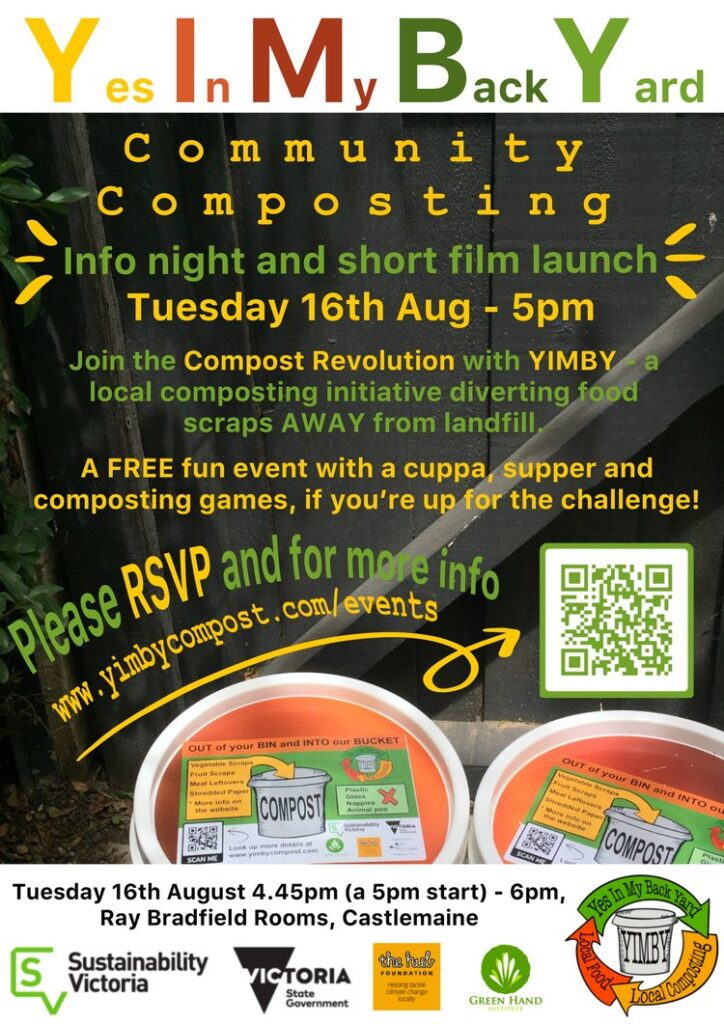
2. Castlemaine Women’s Rights of Passage
What: Information Evening
When: Wednesday 17th August, 7 – 9 pm (arrive by 6.45pm)
Where: Campbell’s Creek Community Centre, 45 Elizabeth Street, Campbells Creek
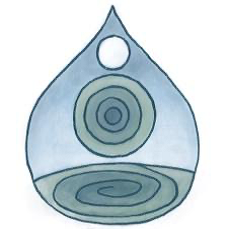
What is a Women’s Rite of Passage for Teenage girls? Join us with special guests TIDES Rites of Passage from New Zealand. We are excited to share information about Rites of Passage and the details of our program running 7th-10th October, 2022. Parents are integral to the program and all family members are welcome. This program has been designed for any young person or adolescent who identifies as female, and who wants to move consciously across the threshold into womanhood.
Supper will be provided. Gold coin donation appreciated.
For further information and booking please contact: castlemainewrop@gmail.com
Women’s Rites of Passage
Castlemaine Women’s ROP acknowledges that this event will be occurring on Dja Dja Wurrung Country, land of the
Djarra people, and pay our respect to the custodians of this land. We acknowledge that sovereignty was never ceded
3. Repair Cafes and Workshops
Daylesford
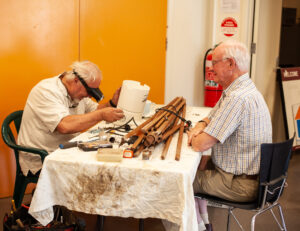
What: Daylesford’s August Repair Cafe includes a workshop on pulling things apart and putting them back together with Mr Fixit- Julian Alaba
When: Sunday August 21st, 1-4pm
Where: Victoria Park Pavillion, Ballan Road, Daylesford
In addition to the workshop, our range of skilled fixers can help repair things electrical and mechanical, household and garden items, and bicycles. They can sharpen knives and tools and can can help mend and darn clothes. Enjoy a cuppa and cake at the cafe and chat to other locals while your items are being repaired.
Castlemaine
Bring your clothes, radios, toys and all kinds of household goods for repair.
When: Sunday August 28th, 10am – 1pm
Where: Castlemaine Community House 30 Templeton St, behind the Town Hall. Enter through car park and garden to back door.
For more information: Call Chris Hooper on Ph 5470 5508 or https://www.facebook.com/groups/castlemainerepaircafe/permalink/1724723457919772
Ballarat
When: Saturday August 27th, 1-4pm , at Barkly Square, 25 Barkly St, Ballarat East. The Ballarat Repair Cafe is also connected to the Ballarat Tool library.
4. Film Screening- Planet Local — A Quiet Revolution
What: Screening and Discussion- a joint venture between Localising Leanganook and Castlemaine Free University
When: Monday 5 September 2022, 7pm–9pm (doors open 6.30pm)
Where: Northern Arts Hotel, 359 Barker Street, Castlemaine, 3450
A free event. Drinks can be purchased at the bar
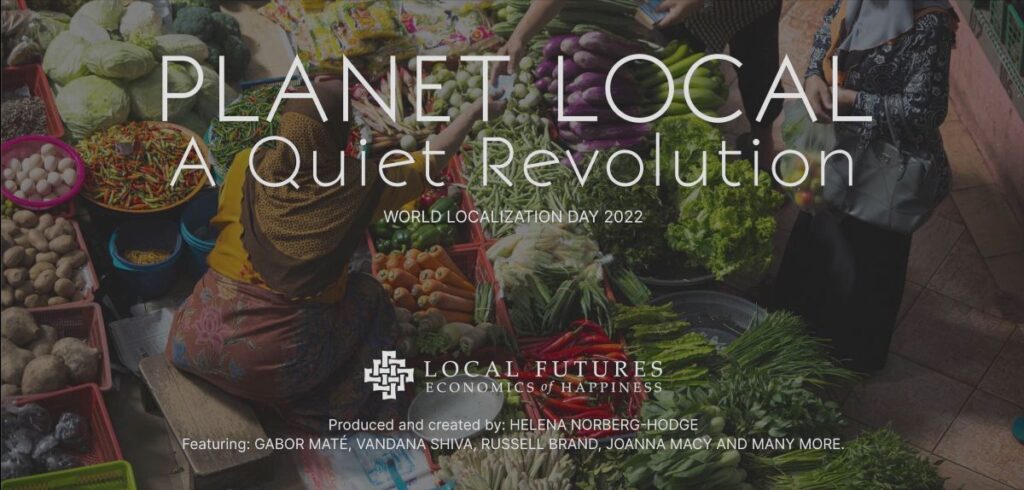
Local Futures recently released their 50-minute film Planet Local — A Quiet Revolution on World Localisation Day. The international film features grassroots activists alongside well-known figures such as Noam Chomsky, Vandana Shiva, and Helena Norberg-Hodge to offer inspiration, clarity and a call to action in a dark world. From restoring topsoil to sharing traditional knowledge and opposing free trade treaties, they propose a path forward for humanity.
The film is presented by Carolyn Neilson, Ilka White, John Terry and Nikki Marshall of Localising Leanganook whose members continue the spirit of the 2015 Castlemaine Local Lives Global Matters — A Conference for Future’s Sake. That conference offered space to share ideas and stories of active sites of resistance, to both imagine and renew relationships between humanity and nature in rural central Victoria, and to connect with stories of activism in other parts of the world.
For more than 40 years, Local Futures has raised awareness of the power of going local to restore ecological and human well-being for decades, with a mantra of Rethink, away from globalisation to glocalisation; Renew — local economies and communities, cultural and biological diversity; and Resist.
5. Yandoit Cultural – Winter stories and music at the old church in the bush
 Yandoit’s historical Uniting Church is now in community hands and is being run as a community arts and culture space, called Yandoit Cultural.
Yandoit’s historical Uniting Church is now in community hands and is being run as a community arts and culture space, called Yandoit Cultural.
What: Winter Solstice – Musings on a Common Theme from Uncommon Places
When: Sunday August 28 from 2pm – 4.30pm
Where: Yandoit Cultural, Uniting Church Road (off High Street) Yandoit 3461
Entry by donation (cash only) with Tea/Coffee/Wine and Afternoon Tea provided
Join us for an afternoon of spoken word, song, history, performance, storytelling and visual art. Three groups. Many voices. Unexpected perspectives.
Presented by: Yandoit Cultural – the old Uniting Church in the bush, run by the community as an arts and culture space;
Lab Kelpie – a new writing theatre company now based in Daylesford.; and
Roomers – a creative collective living and making in the City of Port Phillip, Melbourne
For more information: nikki.marshall@mmnet.com.au or https://www.facebook.com/yandoitcultural
What: Django Fretts Concert- Gypsy Jazz Quartet
When: Saturday August 27th, 7pm
Where: Yandoit Cultural, Uniting Church Road (off High Street) Yandoit 3461
Entry by donation
The Django Fretts are a gypsy jazz quartet from Castlemaine. Formed in 2015, the Fretts have an extensive repertoire of tunes taken from the Django Reinhardt songbook as well as a few American jazz favourites. They have played extensively around the goldfields region, honing their up-tempo sound at markets, gigs, and festivals. A set from the Django Fretts will evoke the mood of 30s Paris with authentic gypsy jazz melodies and acoustic improvisations.
For more information: nikki.marshall@mmnet.com.au or https://www.facebook.com/yandoitcultural
6. Australian Conservation Foundation (Bendigo) – Bushwalk
When: Friday 19th August, starting from our meeting point at 10.00 am and returning to the meeting point at approximately 12.30pm.
Where: A moderately challenging walk on Lanjanuc and enjoy some expansive views (if the fog allows), within Mount Alexander Regional Park.
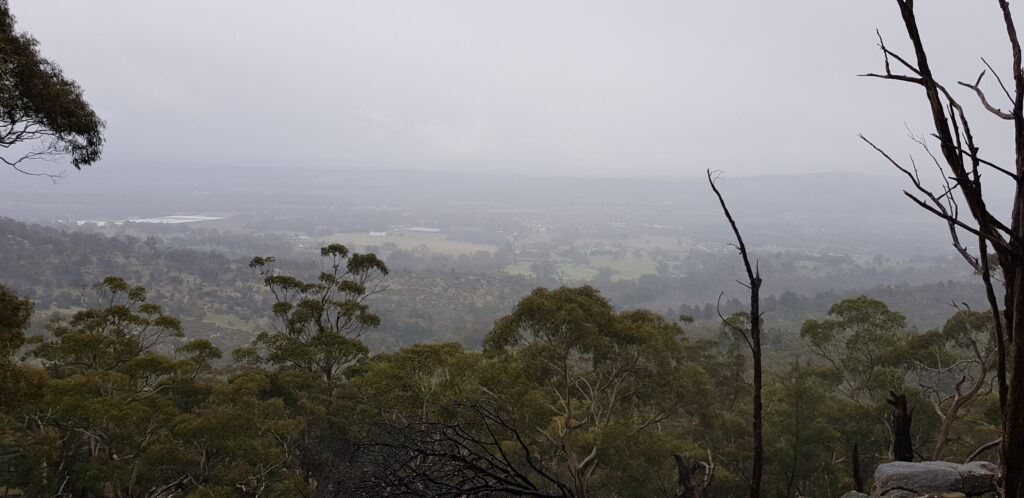
The walk will take approximately 2.5 hours to complete. The tracks are quite steep, rocky and slippery in places and many trees have fallen across the path. Sturdy footwear is very important. Also, please wear suitable clothing, bring drinking water and snacks, and protect yourself from sun, mosquitos, wind and rain.
Register: https://www.acf.org.au/acf_central_victoria_august_bushwalk
If you register, we will have an idea of how many are coming so we don’t leave you behind if you are running late! Please include your phone number when you register, so we can call you if you haven’t arrived by 10.00 am or if there is a belated change.
Friends and family are welcome but should register individually, as we like to have names and contact numbers for all participants.
If you want to carpool from Bendigo, contact Jill: 0419353116 or jillmfred@gmail.com
7. Mt Alexander Housing Network
- Vacant dwellings
- Tiny homes on Wheels (THOW)
- Shape MT Alexander affordable housing
- Home Share
There’s some advocacy work happening within the vacant dwelling and tiny homes on wheels working groups but there are certainly plenty of other advocacy work we can get our teeth into. If you are interested in being part of these working groups contact KAZ on 0439550904.
and started to meet . If you have a particular interest and feel you would like to contribute please ring

My Home Network 10 year social and affordable housing strategy: The summary and full versions of the strategy can be found via this link –on the right side of the page under reports and plans Housing | Central Victorian PPH (centralvicpcp.com.au)
Community vigil-homlessness week
Thanks to everyone for their support of the community vigil on Thursday-we reckon about 40 people attended the candle lit vigil -17 candles for the 17 community members sleeping rough in our Shire. Many attendees had their photos taken with signs with messages regarding addressing homelessness and these were loaded onto social media. Thanks to Pauline Bolch for doing a beautiful Acknowledgement of Country and Dhelkaya Community Health Housing Team for driving the event. Thanks too to Suzanne Donisthorpe of Hear Say on Maine FM for having us on her programme.
Action from here is MHN advocacy to Federal and State government to increase crisis and transition housing and social housing, increase Home Share happening in our Shire, engaging with shop top and vacant dwellings landlords encouraging their release as affordable rentals and engaging with local accommodation providers to release accommodation as crisis and transition housing.There will be hopefully be media releases in the Castlemaine Mail and Midland Express in the next week or two.
Vacant Properties
An update on the amazing research and advocacy work of local Karl Fitzgerald, director of Prosper Australia Prosper Australia | Access → Opportunity → Prosperity Prosper Australia advocate for the taxation of the economic rents arising from property rights in land and natural resources, including government created monopolies. Karl has been passionate about revealing Melbourne’s hidden housing supply. He has always thought it strange that in a ‘housing supply era’ we barely measure under-utilised supply. His work on Speculative Vacancies Speculative Vacancies in Melbourne – identifying idle sites by using abnormally low water consumption-. Karl recently established the Global Empty Homes Network along with US NGO Local Initiatives Support Corporation & UK campaigners Action on Empty Homes. Their research on vacant dwellings did not go far enough up the supply chain, to measure what was happening in the land banks of major developers. It was here that hundreds of thousands of lots sit unmeasured and without any oversight. Karl’s recent report for Prosper, Staged-Releases-Prosper-Australia-web22.pdf where he has built up the group’s research focus over 18 years.
This report investigates the rate of lot sales in nine major master-planned housing developments. Their research reveals a “staged release” approach that responds to price growth but appears crafted to avoid supply-led price declines. Here’s a snippet from the ABC 24 interview his op-ed the Premier saying yes we need to fix this. He has recently set up an incorporated organisation called Grounded – an advocacy group for Community Land Trusts.
At a local level Dhelkaya Community Health Housing team and MHN with the support of Council are going to approach targeted local businesses who have vacant shop top dwellings to encourage their release as affordable rentals. The vacant dwellings working group are planning approaching known landlords of vacant dwellings to have a conversation regarding their dwellings release as affordable rentals. We are also considering advocating to State Government regarding the vacant property tax that currently is only applicable to Melbourne Councils.
Tiny Homes On Wheels (THOW) working group
A delegation from the THOW working group is having a preliminary discussion with local laws officers and other Council staff this week as part of their review of the local byelaw 13 regarding THOW. Thanks to Fred Schultz of Fred’s Tiny Houses for his expertise.
Shape Mount Alexander affordable housing
Council are kindly sharing aspects of their online affordable housing platform with the My Home Network and Dhelkaya Community Health to scope interest in Home Share and release of vacant dwellings and shop top properties. Please refer those you know who have vacant dwellings or would be interested in Home Share to : Let’s talk about affordable housing | Shape Mount Alexander
Home Share
In the absence of funding for a Home Share coordinator three families have taken the bull by the horns and are crafting their own Home Share arrangement with a bit of support and Home Share reference documentation to guide them. Fantastic! Home Share is an internationally recognised scheme for formally pairing householders, who could benefit from help in the home and companionship, with individuals (homesharers) prepared to give practical assistance in return for free accommodation. It is based on principles of fostering independence, mutual benefit and reciprocity.
8. Wararack Networking Event
When: Thursday 1 Sept 2022 ⋅ 5:30pm – 8pm
Where: Shedshaker Brewing Company, 9 Walker St, Castlemaine
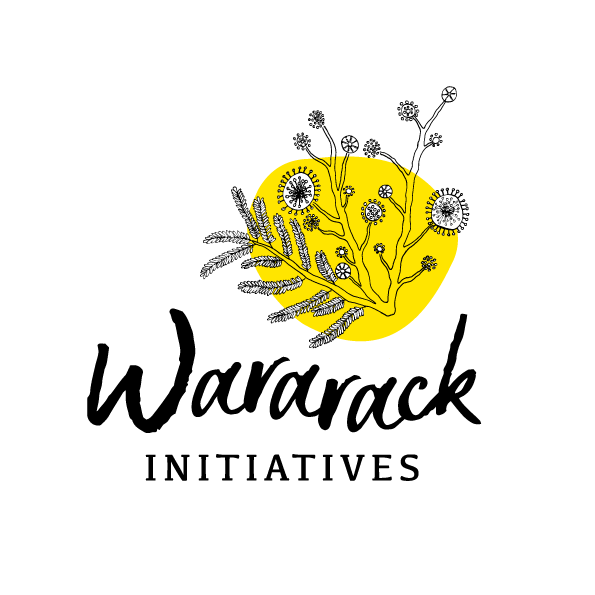
What better day to reschedule our Wararack Networking Event than the first day of Spring, Thursday 1 September, officially National Wattle Day of Australia. The Wararack (silver wattle) is the spirit of our climate emergency response. The sap of this plant is the glue that connects community and Jaara Country. Our plan is to collectively build resilience,equity and care for Country into our systems and culture while transitioning our shire to zero net emissions.
With the change in season, the promise of new beginnings and hopefully the improved health of our community this event will help to progress our movement and ‘keep the ball rolling’.Whether you are a current or previous contributor or have put your hand up for the Steering Committee or a Working Group or expressed any other interest in the Wararack Initiatives*, we would like you to save this new date and look forward to meeting you in person on the night.
We plan to:
· bring a snapshot of progress to date lifting the curtain on the work that has been happening behind the scenes
· show case a couple of initiatives to stimulate our thinking and conversation
· provide time for networking and building alliances with others who can strengthen action already happening in the shire
For planning purposes, please confirm your attendance by accepting this meeting invitation. Having trouble accepting this invitation/meeting request? Just send an email here with your name to let us know you will be joining us.
Unable to attend on the night? Join us online as we live stream the main presentations via the’Google Meet’ link attached to this email.
* Need a reminder of what the Wararack Initiatives are all about and seeking to achieve? Please click on the websitelink here
9. Monthly guided tours of Melliodora
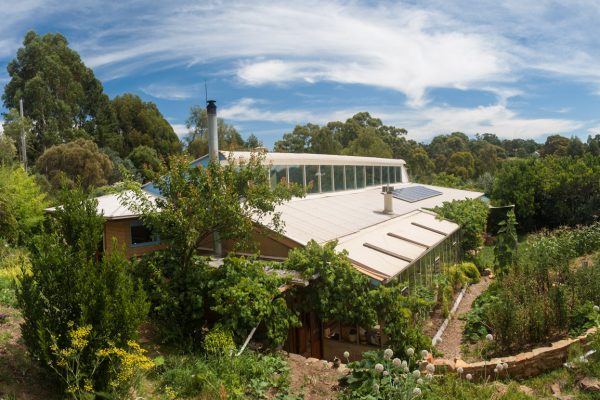
The one hectare property has been transformed from the blackberry covered wasteland in 1985 into a model of small-scale intensive permaculture. Permaculture co-originator David Holmgren and his partner Su Dennett will show you how their passive solar house, mixed food gardens, orchards, dams and livestock, as well as creek revegetation, have been developed and maintained. Whether you are renting in the suburbs, or live on a large rural property, you are sure to discover ways that you can apply the underlying principles and strategies of permaculture to your own situation.
10. Climate Ready Community Conversations
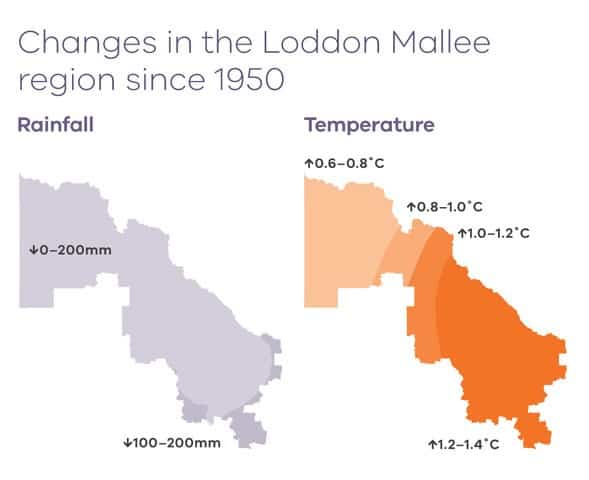
Over the past months the Mt Alexander Deliberative Engagement Group have been bringing locals together to talk about climate readiness and adaptability. Fires, floods, droughts and the pandemic are all indicators of climate change . Information from theses community conversations is being collected including themes emerging, what residents value about living in MAS, and what are the priority risks of climate change and adaptation strategies most appropriate here. This information will be widely shared — with MASC and other local shires – to assist with developing their climate change strategy, ADAPT Loddon Mallee, and built into future Wararack Initiatives and other local climate change adaptation strategies.
The conversations take approximately two hours and offer opportunities to share information on amazing initiatives currently happening in our Shire and to mobilise and galvanise the community on climate change adaptation.
Over the last six years a number of locals have been exploring the concept of, and developing expertise in, deliberative engagement — placing people (citizens, residents, affected individuals) closer to the affairs of government and decision makers. Experience in holding Kitchen Table Conversations (KTC) has been developed; also engaging in Citizens Assemblies (bodies formed from randomly selected citizens to deliberate on important issues), community panels, and democratic renewal (adjusting the institutions of local government to make them more democratic) as well as various types of group process capacity building.
Image from : https://www.adaptloddonmallee.com.au/about/climate-ready-victoria/
The group comprises community members and representatives from community and government organisations including Central Primary Care Partnership (CVPCP), Community House, Mount Alexander Shire Disability Advocacy Group (MASDAG), Mount Alexander Sustainability Group (MASG), Mount Alexander Ecohousing Group (MAEG), Localising Leanganook, Castlemaine Commons, Yandoit Clydesdale and Franklinford Community Planning Group, CHIRP/Castlemaine Health, Mount Alexander Shire Council and the Castlemaine Institute. We liaise with Nalderun Aboriginal Education Cooperative and are supported by Department of Environment Land Water and Planning (DELWP) Adapt Loddon Mallee.
If you are interested in participating in a climate ready conversation email: Carolyn Neilson –projects2@centralvicpcp.com.au; Anitra Nelson – anitra.nelson@unimelb.edu.au or Nikki Marshall – nikki.marshall@mmnet.com.au
11. Community Concern over Dan Murphy’s in Daylesford
From the Wombat Post, Aug 10, 2022
Residents have expressed concerns about the development of a Dan Murphy’s store at 63 Central Springs Road opposite the Daylesford Pool. Last week’s article in the Wombat Post was widely discussed and drew a range of comments and concerns on social media. The proposed site is close to the pool, the kindergarten and the Daylesford Primary School and there are concerns that children will be exposed to daily alcohol advertising.
Chain stores like Dan Murphy’s and McDonalds also have the potential to change the historic and unique character of the town into just another suburban shopping complex. There are broader issues about the Endeavour Group, which owns Dan Murphy’s. Endeavour is a spin off created in 2021 from the merger of Woolworths liquor assets and the hotels and pokies empire developed by the Bruce Mathieson Group (BMG). After Endeavour was floated, Woolworths and Mathieson retained about 15 percent each of Endeavour. It is a highly profitable, giant corporation with a market capitalisation of $14.08 billion.

The Endeavour Group has a stable of brands. They include the former Woolworths liquor retailing businesses including BWS and Dan Murphy’s. It also owns the online liquor delivery service Jimmy Brings, the ALH hotels group, Cellar Masters, Langton’s, Shorty’s Liquor and Pinnacle Drinks. The Dan Murphy ‘s division of Endeavour has 248 stores operating across Australia with 74 in Victoria. The Endeavour Group also has over 12,000 poker machines at around 300 venues across Australia. Daylesford currently has 25 poker machines at The Royal Hotel. Expenditure on pokies at the Royal last year was reportedly $1.6 million.
Setting aside restaurants, Daylesford already has seven liquor sales venues within 500 metres of Vincent Street including hotels, wine shops, bottle shops and retail liquor outlets . There is another development for a liquor outlet at 24 Vincent Street. Cellarbrations and Liquorland are the major competitors for a potential Dan Murphy’s store. Cellarbrations is franchise model with local independent operators with over 700 stores nationally. It is controlled by Metcash through ALM (Australian Liquor Marketers). ALM owns Cellarbrations, Bottle O, IGA liquor, Duncans Liquor, Thirsty Camel, Big Bargain Liquor, Porters Liquor and Merchants Liquor. Liquorland is owned by Coles (Wesfarmers).
The Endeavour Group, and Dan Murphy’s, has a mixed reputation. It’s online liquor delivery service, Jimmy Brings, is being investigated for liquor law breaches in New South Wales after a 49 year old man died in Bondi in 2018 after reportedly placing around 300 orders for several bottles of alcohol at a time over three years. Woolworths experienced a major backlash when it sought to open a Dan Murphy’s megastore in Darwin. The store was near three dry indigenous communities on Darwin airport land. Given the fierce opposition, Woolworth’s withdrew the proposal but has refused to rule out a further development through its subsidiary Endeavour Group.
Alcohol has both benefits and harms. The benefits are mostly the personal and social experience alcohol brings. There was a view that drinking moderately might result in health benefits. But recent research shows there are in fact few if any health benefits and drinking too much is associated with social and health harm, including domestic violence. Health authorities now recommend drinking no more than an average of 10 standard drinks of alcohol per week and no more than four in any one day. On average Australians drink more alcohol than is good for them. One in four people drink more than what is recommended. But worse than that, alcohol use is very skewed. About a fifth of people don’t drink at all and over 50 percent of Australian alcohol consumption is by 10 percent of the population at 8 standard drinks a day (more than a bottle of wine). This group can expect significantly increased health problems and reduced life expectancy. And alcohol abuse is worse in regional and country areas.
Increasingly companies like Endeavour and Dan Murphy’s face pressures from investors and regulators to meet environmental, social and governance standards. The argument that harm minimisation is an individual responsibility doesn’t wash any longer and investors are not keen to be associated with companies that don’t act responsibly. This includes harm minimisation from gambling and alcohol. Maximising short term profits at the cost of corporate responsibility is increasingly a risky strategy.
Few in the community want prohibition. But the community does want a responsible and planned approach to alcohol sales that includes limiting the number of outlets, store size, hours, advertising, position and terms of service that protect people from harm – particularly vulnerable groups, including young people, gamblers and people with drinking problems. This is best done when liquor outlets have strong connections and engagement with the community. Engagement places checks and balances on those who sell alcohol, rather than being simply profit driven.
12. Transmission Line Update

Upgrading the powerline that traverses swathes of land between Ballarat and Bendigo, including through Yandoit, is part of the AEMO preferred option to increase the electrical connection between VIC and NSW by 2031. While the detailed route for the ungraded line has not been released, both the Victorian and Federal governments have expressed support accelerating the upgrade earlier than 2031. The upgraded line will likely consist of 85m tall towers on a 70m easement clear-felled of trees and buildings vs the current 35m towers on a 40 yard easement. On July 29th the AEMO released a report (Project Assessment Draft Report – PADR) on the economic viability of the upgrade. AEMO are now seeking ‘consultation’ on the economic viability including comments on the analysis and ranking of their preferred option ( they had 5 broad options originally) but not consultation on detailed choice of route, this will come later in the process probably early 2023. Residents and communities affected by the transmission lines need to be preparing for this choice of route ‘consultation’ by registering significant trees landscapes and natural amenity in our area to ensure that the unique heritage and fauna of our area are taken into account when the powerline route is chosen in 2023. More info from the proponents and a copy of the PADR is at www.tinyurl.com/yandoittowers.
13. Words in Winter
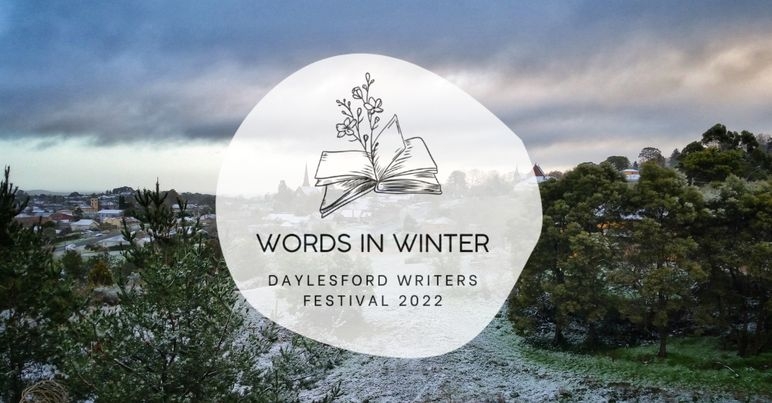
After several years of being thwarted by Covid and lockdowns, Words in Winter is back again over the last weekend in August, starting Friday afternoon August 26th and finishing on Sunday evening August 28th. Events will mostly be held at Radius Gallery and Bellinzona in Main Street, Hepburn Springs. There’ll also be events at Yandoit Cultural and a series of events in Trentham throughout the month of August (https://www.wordsinwintertrentham.org/)
Words in Winter is a literary and arts festival held in August in the Hepburn Shire and surrounding districts. Words in Winter is a celebration of words, stories and ideas in all their forms shared by locals and visiting presenters through readings, poetry, theatre, music, talks, workshops, visiting authors, and exhibitions.
The festival program, which runs from Friday, August 26 to Sunday, August 28, will be headlined by Alex Miller. Alex is twice winner of Australia’s premier literary prize, the Miles Franklin Literary Award, first in 1993 for The Ancestor Game and again in 2003 for Journey to the Stone Country. He is an overall winner of the Commonwealth Writers’ Prize, in 1993 for The Ancestor Game. His fifth novel Conditions of Faith won the Christina Stead Prize for Fiction in the 2001 NSW Premier’s Awards. In 2011 he won this award for the second time with his novel Lovesong. He is a Fellow of the Australian Academy of the Humanities and a recipient of the Centenary Medal for an outstanding contribution to Australian cultural life.
Alex Miller will be in conversation with Jane Sullivan at Bellinzona on Saturday, August 27 from 1:00 to 2:00 pm. They will discuss his highly praised new book, the non-fiction work, Max. The book is Miller’s first full length work of non-fiction, an astonishing and moving tribute to friendship, a meditation on memory itself, and a reminder to the reader that history belongs to humanity.
The festival will kick off with the traditional open mic poetry and Cicada Story Slam at 6:00 pm on Friday evening at the Radius Art Gallery in Hepburn Springs. The program includes Dennis Altman in conversation with Carmel Bird, Mahmood Fazal & Osman Faruqi, and local artist and human extraordinaire, Petrus Spronk. Other guests include Ross Gillett, Eloise Grills, Mark Dickenson’s writing workshop, Beverly Risstrom’s fireside funeral chats! The finale will be announcement of the Venie Holmgren Environmental Poetry Prize.
Events are planned in Hepburn, Daylesford, Trentham, Creswick, Yandoit and Maryborough. Visit the Words In Winter Facebook and Instagram pages for program updates and tickets. Here’s the program: https://wordsinwinter.com/programme-2022/
14. Self Reflective Conversations
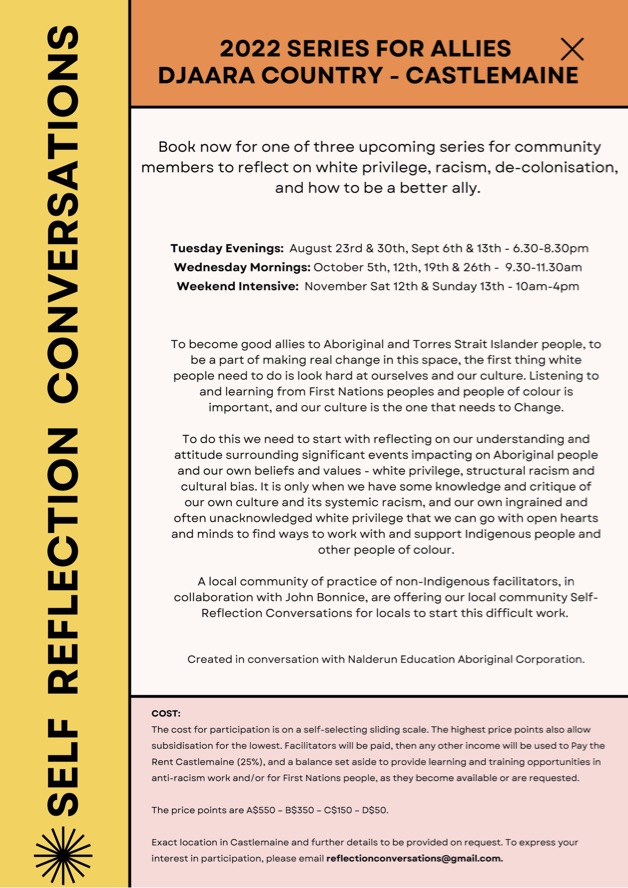
15. Newstead Spinners Group
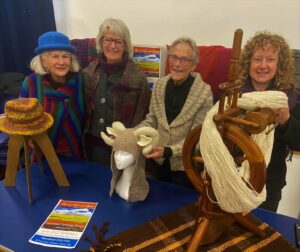
When: Every second Tuesday
Where: Newstead Community Centre
Join with others who enjoy spinning, weaving, knitting and all sorts of fibre arts. Share your fibre skills with us along with your desire to learn more.
Contacts: Sally Weis (President) • 0400 922 027; Anja Tuseck (Secretary) • 0407 806 004
16. Make a Change Workshops

What: Expand your impact workshops: Two workshop series to choose from:Wednesdays 4pm – 5.30pm
6 online sessions, starting 10 August Thursdays 10.30am-12noon
6 online sessions, starting 11 August
With in person options available in Wycheproof & Charlton
Expand Your Impact is a program that challenges you to think a little differently, supporting you to grow your success. Join this inspiring online series to:- nut out challenges- create new approaches- develop new solutions …for achieving your goals [no matter how big or small in any area of life
What topics are covered?Expand your Impact covers 6 essential elements for growth & success:
Vision- Discovering & rediscovering ‘what lights YOU UP?’
Projects- Giving thoughts & ideas the structure to MAKE THEM HAPPEN
Story- Creating YOUR compelling narrative, to ENGAGE OTHERS
Team –Building networks, growing communities & enlisting SUPPORT
People Working together effectively for GREATER OUTCOMES
Digital Tools –Navigating the world online with IMPACT
WORKSHOP Series #2 Wednesdays 4pm-5:30pm, 10 Aug to 14 Sept
WORKSHOP Series #3 Thursdays 10:30am-12pm, 11 Aug to 15 Sept
WORKSHOP Series #3 Thursdays 10:30am-12pm, 11 Aug to 15 Sept
For more information visit: https://makeachange.org.au/buloke
17. Alliance for Responsible Mining Regulation

This Victorian based group has active participation from individuals and local groups across central Victoria including: Bendigo and District Environment Council, Save Huntly Streamside Reserve, No Mining Yandoit Region, Save The Campaspe, No Gold Diggings Castlemaine, Mine Free Glenaladale, Let’s Stop Proposed Mining Exploration in North East Victoria, Don’t Undermine Steiglitz, No Gold Drilling (and no more Gold Mining) in our Shire Valleys, Wombat Forest Care, No Wombat Gold. The Group is supported by Friends of the Earth.
Lock the Gate signs are available and the group is currently working towards legislation reform. If you are interested in getting access to lock the gate signs or contributing towards the work of this group, contact johnlewis@arcimedia.com.au or hello@nominingyandoitregion.com
18. Sustainable Hepburn Strategy
Hepburn Shire Council’s new environmental sustainability strategy, Sustainable Hepburn 2022-26, will be presented at the 16 August 2022 Council meeting for adoption. This finalizes the strategy development process which began last October. Sustainable Hepburn acknowledges the interconnected relationship between many facets of environmental sustainability and speaks to four key themes. Each theme shares elements of crossover which each other, providing an opportunity for deeper collaboration and partnership both within Council and between Council and community.

Sustainable Hepburn’s themes are:
- Beyond zero emissions: Achieve and maintain beyond zero net emissions from council activities by installing and purchasing renewable energy, increasing energy efficiency, designing for local climates, offsetting where appropriate and providing options for low fossil fuel-based activities.
- Natural environment and biodiversity: Protect and enhance biodiversity values across the Shire through restoration of natural environmental values, appropriate land use, knowledge sharing, and improved capacity of Council.
- Low waste: Reduce waste to landfill, increase and improve recycling and extend services across the Shire for reuse of materials and develop circular economy opportunities.
- Climate resilience: Council’s infrastructure, services and the community can adapt to the impacts of a changing climate, know what actions to take in extreme weather, are more informed about climate risk and water is valued as a vital natural resource.
19. Shepherds Flat Land Care Group – community planting
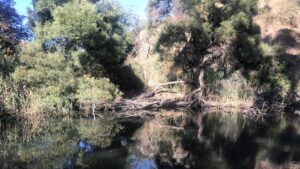
What: Shepherd’s Flat is holding a community planting event on Sunday Aug 28th, 11.30am to 1.30pm followed by BBQ.
Where: The newly named creek- Larni Barramal Yaluk, Carrolls Lane Reserve, Shepherds Flat.
This is a Queen’s Jubilee event, supported by Australian Govt. & Hon. Catherine King MP.
Register with Jill Williams: 0437751824.
20. Climate Change and Health Resource
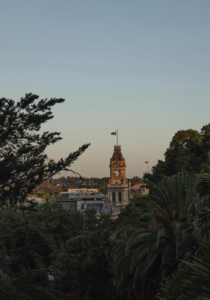
This is a new resource for organisations working in central Victoria- Climate Change and Health: Local pathways for action and evaluation. Produced by Bendigo Health in collaboration with Castlemaine Institute, July 2022
As evidence grows about the population health impacts and implications of climate change there is a rapidly growing demand for place-based work to guide local action to address the health and social impacts of climate change. Bendigo Health has produced this resource to assist organisations in Central Victoria to identify and reduce the impact of climate change on the health and wellbeing of our community, particularly for our most vulnerable population. This resource is one output of the Central Victorian Primary Care Partnership’s (CVPCP) Community Resilience project which developed strategies to address the impacts of climate change on the health and wellbeing of our community.
This guide:
— demonstrates how climate change impacts on people’s health and wellbeing
— includes relevant policy documents that can inform advocacy and climate change adaptation and mitigation action
— demonstrates the co-benefit of climate change action and health outcomes
— identifies opportunities for organisations to work in the climate change adaptation space
— supports evaluation of effort with the inclusion of suggested indicators
— provides recommendations for the next steps.
Here’s the link : Climate Change | Central Victorian PPH (centralvicpcp.com.au)
21. Local Pasture Raised Pork and ORTO Farm Workshops
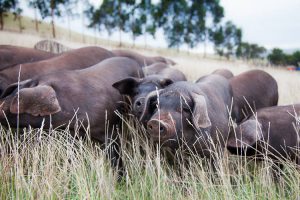
ORTO Farm in Blampied, Central Highlands, is now producing Pasture Raised Pork. For more details and to secure your Pasture Raised Cruelty Free Pork please visit https://villagedreaming.com.au/workshops/
ORTO Farm is running a variety of workshops over the next few months including:
- Fermenting Vegetables in Bulk- August 28th
- Braided Rag Rugs with Ilka White – September 11th
- Felted Body Wraps – September 18th
- Making sour dough bread- October 16th
and much more…
Here’s the workshops link for more information: https://villagedreaming.com.au/workshops/
22. Braided Rag Rug and Handloom Weaving Workshops
A great way to recycle old clothes and fabric!

When and Where: VILLAGE DREAMING, BLAMPIED – Sunday, September 11, 10AM – 4 PM
Bookings : www.ilkawhite.com.au/allclasses/braided-rag-rugs-blampied
or ONLINE – 2 x 3hr workshops offered approximately monthly
See : https://www.ilkawhite.com.au/classes
INTRODUCTION TO HANDLOOM WEAVING –
Learn to weave your own fabric from scratch!
When and Where: 5 Saturdays, September 10 to October 8, 10 AM – 4 PM, Castlemaine Community House
Beginners course. Looms supplied. No weaving experience required
Bookings : https://ilka-white.corsizio.com/c/626f430c135b31b5e8ac7698
23. Saltgrass Podcasts
Salt of the earth people grassroots change. Informative, warm, wise and insightful, Saltgrass is worth a listen.
Saltgrass is produced on Djaara country in Central Victoria by Allie Handley. Each episode is a new story, a different angle and a fresh voice. These in-depth interviews feature all sorts of everyday folk, including farmers, psychologists, ecologists, artists, change agents, and scientists about what they are doing to address the climate emergency.

Below you can read about the following:
- Recent Episodes: see what we’ve been talking about lately
- In other news: SBS series about migrant and refugee women in regional Victoria.
- Merch Don’t forget Saltgrass has a range of ethical clothing and accessories. It gets to you fast, but it ain’t fast fashion!
- What’s next? What have I got for you for between seasons…
Season 4 has come to a close and Saltgrass has been given funding for season 5!
Recent Episodes
Here are some of the highlights of Season 4 of Saltgrass. Check out the full season on your podcast app or click here. Allie has been working on a podcast series called New Home with SBS about migrant and refugee women living in regional Australia. There are eight episodes of about half an hour each. It has been really interesting and moving to talk to these women about their lives and it has been an honour to have been entrusted with their stories. Each one has come from a different part of the world, under very different circumstances, but they are all now part of my community here in central Victoria. Have a listen.
What’s Next?
A panel discussion Allie was part of last year at the NonfictioNow Conference will be uploaded to the podcast for you to have a listen to. It is a discussion between myself and several other climate podcasters, discussing our shows and all of the dynamics that we wrestle with as climate communicators. There’s also a series that was created by Zoe Scoglio and the Castlemaine Commons Collective. Zoe found an interesting array of people in our region who had different perspectives on how community resilience works and how it is created. She came on MAINfm with me for some live shows in March this year to share her work with the local radio audience, but then we thought, why not share it even further afield. So that will be shared to the podcast over the next couple of months.
For more information: Allie Handley, Saltgrass Podcast Saltgrass c/o MAINfm PO Box 1070Castlemaine, Victoria 3450
24. MaLETS
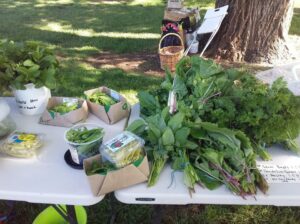 Eat locally grown, food in season.
Eat locally grown, food in season.
Come the Trading days to share your produce, ideas allowing more members to be involved.Come, do your weekly grocery shopping at the Ma LETS Trading Stall. Freshly picked, locally grown, low miles travelled, homemade preserves, for your family.
Trading days on Duke Street Castlemaine: Every Saturday morning: 8:30am to 12:30pm.
Check the Ma LETS Facebook page for the Trading Day cancellation due to inclement weather during the winter months.
Maldon Community Market: 9am to 1:30pm @ Bill Woodfull Reserve, Francis Street, Maldon.
This market can carry home grown produce, preserves, soaps & plants only, as per Maldon Community Market Committee.
WHOLE FOODS PROJECT: Available at Ma LETS on Duke Street trading days, every Saturday.
Organic, Bio- dynamic, wholesale price, offering a selection of dry goods & amounts size is for kitchen use only to start the project.
Secretary: Matt Gibson 0423140881 email: gibbo68@hotmail.com
Treasurer Transaction Manager: George Ryan 54762710 email: transmanager@gmail.com
Ma LETS newsletter: Loretta De’nham malets.editor@gmail.com
25. Hepburn’s Community Engagement Policy
From the Wombat Post 29th July
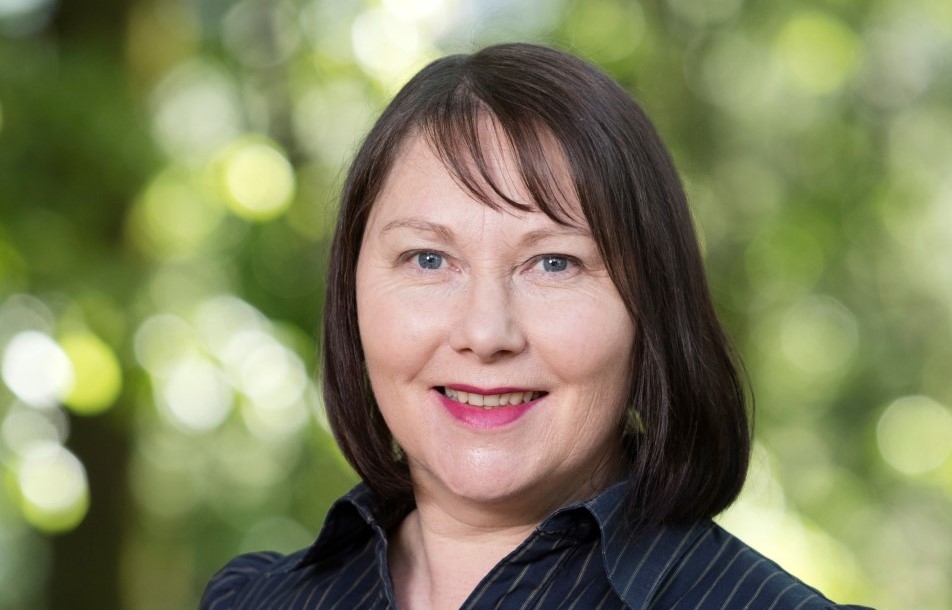
What’s the point in having your say?
I’m hearing a lot of disappointment from the community after the recent decision of Council to sell The Rex to the highest bidder. After extensive consultation with 369 people responding, 66% said they were against selling and wished to keep the building as a community asset. Many ideas were put forward with strong support for a community cinema/theatre, gathering spaces, arts hub, youth café and public toilets.
So, for many people it felt like Council wasn’t listening when it voted down the motion to work together to develop viable options to keep the building for community use. Many people have asked me why Council did not choose to sell the Rex by an Expression of Interest process which would have allowed the chance to review proposals and seek a balance between a good financial return and a suitable outcome for the community.
It takes time and effort to participate in these community engagement activities and I’ve heard from many people that they don’t see the point in giving their feedback anymore.
The objectives of the Community Engagement policy are to:
- Strengthen the relationship between Council and the community.
- Recognise the creativity and expertise of Hepburn Shire citizens and stakeholders in identifying strengths and challenges, as well as developing solutions for our community.
After the July council meeting, many people have been left wondering how this decision has upheld these objectives.
I still have faith in the Community Engagement Policy. When we developed it, I genuinely believed that this would be a guiding document to help us think about complex, “wicked” problems and look for clever and fair solutions. And I still hope that by doing more Community Engagement and making it more accessible we, as a Council, can be more in touch with the needs and wishes of the people and make sound, informed decisions.
Not everyone liked the decision that was made on The Rex. And perhaps Council still has some way to go towards listening and working effectively with our community. But we should not throw out the baby with the bath water. Democracy has long been criticised for its failures over the years. In 1947 Winston Churchill famously said:
“Many forms of Government have been tried and will be tried in this world of sin and woe. No one pretends that democracy is perfect or all-wise. Indeed, it has been said that democracy is the worst form of Government except for all those other forms that have been tried from time to time.”
So don’t give up on Having your Say. Our Community Engagement may not be perfect, but it is the best way to hear and understand the needs of our community. I personally read every survey response on The Rex – all 369 views, and I learnt a lot, both from those in support and those against the sale.
I want to encourage every member of our community to keep up the communication with their council. Wherever there is an issue that is important to you, or you are passionate about, keep talking to us. Whether it’s filling in a survey, coming to a Listening Post, Pop-Up info session, community forum or sending us an email – we need to hear from you. I am always open to meeting with any member of the community who would like to share their views, and I will endeavour to bring those to the discussion table so your voices can be heard.
Have your Say at: https://participate.hepburn.vic.gov.au/
Councillor Jen Bray, Birch Ward, Deputy Mayor, Hepburn Shire
Email: jbray@hepburn.vic.gov.au Phone: 0428 150 652
26. Northern Arts Hotel- What’s On

FILM
Secret Matinee Film | Sun 14 August
CFU Planet Local | 5 September
Screen Tales @ NAH | 10-11 Sept
MUSIC
Northern Music Session | 11 August
The Martini Set | 13 August
Tony Backhouse Workshop | 17 August
Guildford Folk Club at the Northern | 18 August
Elements 19-21 August
Celtic Singing Circle | 20 August
Gillian & Terry: Hi Energy Jukebox | 26 August
Maggie Jackson NY Jazz Quartet | 27 August
Big Fat Music Trivia Night | 2 Sept
Trudy & Phil Edgeley | 3 Sept
A Celebration of Country Music from Sept-Nov
Kavisha Mazella Trio | 19 Nov
SPOKEN WORD | TALKS
Restoring the Earth, one person at a time | 15 AugustCFU Planet Local | 5 September
PROJECTIONS
Another Roadside Attraction Live Nightly in Wimble St
27. Hepburn News
Particpate Hepburn- Listening Posts
The schedule for 2022 is:
• Creswick Listening Post – 4pm to 6pm Wednesday 27 July at Creswick Town Hall
• Meet the Mayor – Wednesday 24 August
• Daylesford Listening Post – 4pm to 6pm Wednesday 28 September
• Meet the Mayor – Wednesday 26 October
• Glenlyon Listening Post – 4pm to 6pm Wednesday 23 November.
Find more details on Participate Hepburn.
Listening Posts and Meet the Mayor
Hepburn Shire has launched a new series of Listening Posts and Meet the Mayor sessions, which provide an opportunity to speak with Councillors and staff about local projects, highlight ideas or raise concerns in an informal setting. Listening Posts are open for everyone from across the Shire to drop-in without the need to register or book a time. For the Meet the Mayor sessions, community members are able to book a 30-minute private meeting either online or in-person
Borealis lights up the sky
Many of you will have already seen Borealis, the captivating display of Northern Lights at Lake Daylesford. If you haven’t already booked your tickets, what are you waiting for? Organise a catch up with friends, rug up and take in the spectacular show. It runs until Sunday 4 September. Find out more and book at https://borealisau.com/
2022 Community Recovery Committee
Are you interested in joining the Community Recovery Committee? As a result of the serious impact of the storm and floods in January 2022, the Storm and Floods Municipal Recovery Committee (MRC) is establishing a Community Recovery Committee. The committee will:
- Represent affected communities across the Shire
- Ensure local knowledge and expertise is utilised in long-term recovery
- Advise the MRC on the progress of recovery and any additional needs
- Propose the allocation of the $20,000 Community Recovery Fund from Council.
If you live in a community that was impacted by the January 2022 storm and flood, and are interested in becoming a member of the committee or would like more information, please contact our Storm Recovery Officer on (03) 4373 7373.
Nominations close on 18 August 2022. Find out more
28. Rest Stop Retreats

Rest is the conversation between what we love to do and how we love to be. At Rest Stop Retreats we guide you to have that embodied conversation. Allow the experience to nourish your nervous system and soothe your soul. Join Wander into Wildness and the Foundation to Come Home at a beautiful location in Maldon, central Victoria. Nat and Fran will guide you with: • Sound meditation • Mindfulness • Nature connection • Gentle movement • Nourishing lunch • Morning and arvo teas. BYO mat, water bottle and cosy things. We’ll be gathering on private land in central Victoria on Dja Dja Wurrung country (near Castlemaine)
Rest Stop is not a doing ‘workshop’. It’s a simple (but clever) restorative program for complex times.
$285.00
29. Walking Together – Towards Makarrata- The Seven Sisters
Makarrata = ‘coming together after a struggle, facing the facts of wrongs and living again in peace.’
THE SEVEN SISTERS
The Seven Sisters dreaming story is widely known by First Nations people. Although it has many names and variations, the theme remains constant: a story of a forbidden pursuit and a daring escape, of desire, magic and family bonds. The star cluster named the Seven Sisters, or Pleiades, consists of about 300 stars, with seven of the brightest named for the daughters of Atlas and a nymph, Pleione, from the Greek myth about the Pleiades.
Seen from southern skies, the constellation is part of the Milky Way, and rises above the horizon near Orion in the warmer months.
Desert people know the Seven Sisters as a creation story. As the sisters flee from their pursuer, they form features of the landscape, rocks, water holes and springs. They escape by transforming into stars. The songline for the dreaming story goes from deep in the Central Desert out to the west coast, travelling through many different language groups. It teaches vital skills and lessons of surviving on the land, of changing seasons, of the bonds of family and relationships – how to live with each other, how to live in the environment, and how to be in tune with the spiritual realm.
An evil sorcerer, Yurlu (Orion), admired the beautiful sisters. He wanted one as his wife but he was not of the correct skin group, so marriage was forbidden. In spite of that, he pursued the sisters back and forth across the deserts. They escaped capture every time; once they dug a hole through the back of the cave where he had ambushed them. Yurlu sent a magic carpet snake slithering over the rocks. The sisters grabbed it, thinking it would be good to eat. But the moment they saw Yurlu prowling they realized it was magic, and threw it away. Desperately they sought refuge in the sky. The trickster followed them and the pursuit continues today, with the Pleiades stars being chased across the sky by the Orion constellation.
Amongst its many uses, the story teaches that when Orion can be seen appearing above the horizon in Central Australian springtime, the snakes come out. Beware they don’t catch you!
Here in Dja Dja Wurrung country Orion is Kulkan Bulla. He is an old man teaching a younger one how to dance a special dance, part of men’s business. The Pleiades or Seven Sisters might be the women playing their possum skin drums for the dancers at public ceremonies.
Creation is made visible through such teaching stories, songlines, ceremony and art.
Nalderun Education Aboriginal Corporation is a service that supports the Aboriginal Community, led by Aboriginal people. Many people and organisations in the Mount Alexander Shire contribute to Nalderun; the name is a Dja Dja Wurrung word meaning “all together”.
More information can be found at www.nalderun.net.au
30. Food for Thought
30.1 New Economy Network RECORDINGS AVAILABLE
- Stories of Resilience from the Northern Rivers – catch up on NENA’s YouTube channel here!
- NENA Narratives Week 2022 – don’t miss these workshops and discussions, now available on the NENA website
30.2. Colin Tudge: Farming for People, not Profit
Colin Tudge is a biologist, writer, and co-founder of the Campaign for Real Farming. In his plenary talk at the 2018 Economics of Happiness conference, in Bristol, UK, he shared his insights on modern agriculture and called for food sovereignty, economic democracy and respect for local, traditional knowledge and practice
30.3. Noam Chomsky in conversation with the Post Carbon Institute
Although Noam Chomsky’s critique of US domestic and foreign policy often sparks controversy, few can dispute his standing as one of the leading public American intellectuals of the last century. At the age of 93, Chomsky has witnessed and spoken out about a whole host of episodes and trends in American life, which is why I wanted to speak with him as a follow-up to the Crazy Town episode we recorded on the influence of Powell Memo and the rise of neoliberalism.
Specifically, I wanted to get Noam’s response to something provocative the British author and columnist George Monbiot wrote a few years ago: “the left and centre have produced no new general framework of economic thought for 80 years,” — at least not an alternative to neoliberalism that operates in a world of environmental limits and a climate crisis.
I hope you give my conversation with Noam a listen on your favorite app, a view, or read the transcript.
TL;DR: Chomsky’s critique of neoliberalism – its failures in practice coupled with its dominance as a tool of what he calls “class warfare” – is utterly scathing. But he disagrees with Monbiot’s (and admittedly PCI’s own) views about the limits of Keynesian “green growth” economic policies. And yet Chomsky’s emphasis on community power, going back to his childhood experiences, strongly resonates with themes explored in Season 4 of Crazy Town and PCI’s strong emphasis on the need for community resilience.

![[ Random Image ]](https://leanganook.org/images/image_13.jpeg)

